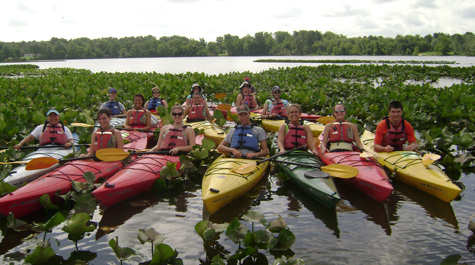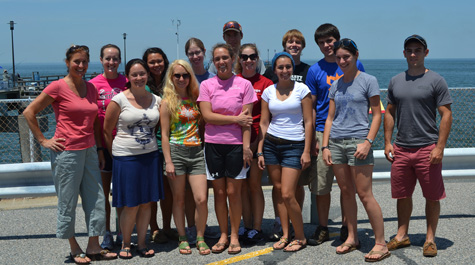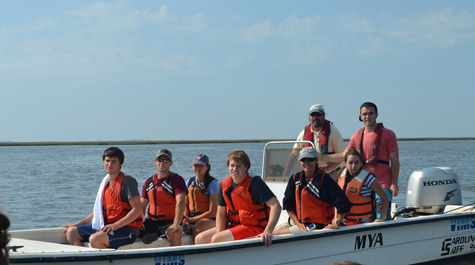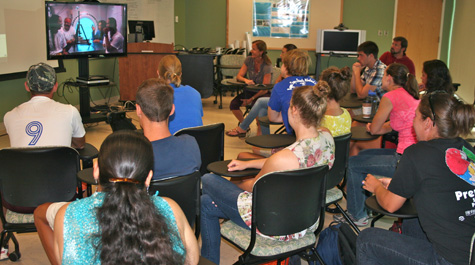Undergraduates gain research experience at VIMS
Twelve undergraduates from across the nation spent 10 weeks at the Virginia Institute of Marine Science this summer gaining valuable research experience in marine science.
The interns in this year’s “Research Experience for Undergraduates (REU)” program were Lydia Bienlien (Morningside College); Jessica Braunstein (Lee University); Pearce Cooper and Sean Lusk (Virginia Tech); Caitlin Fikes (University of Miami); Madeline Karp (The College of William & Mary); Alex Kellum (Clemson University); Joseph Matt (Wake Forest University); Sabrina Ramirez (Old Dominion University); Natalie Ross (North Carolina State University); Laura Tait (Amherst University); and Margaret Walker (University of Mary Washington).
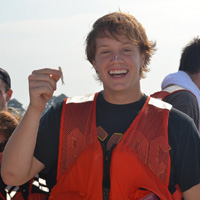
The interns worked with faculty and graduate-student mentors on a diversity of active research projects at VIMS—an aspect of the program that the interns particularly enjoyed. “It was great being able to engage with the grad students and get a real feel for the lab and what it’s like working in that environment,” says Braunstein. “The time I got to spend helping with some of their projects was extremely valuable.”
Hundreds of students from all over the U.S. apply to the internship, with the 12 to 15 handpicked selections assigned a marine project of their own—including being responsible for a final presentation and paper. “I wanted to participate in this internship because it expected such high standards from the interns, and I wanted something that would challenge me,” says Braunstein.
The internship—now in its 23rd year—is funded by the National Science Foundation. It is one of the longest-standing REU programs in the nation, and boasts a high retention rate with more than half of its participants going on to study marine science in graduate school. “This program helped me gain a better understanding of what’s expected of graduate students, and has made me feel more confident in knowing what questions to ask advisors when applying and visiting potential graduate schools,” says Braunstein.
Fellow intern Alex Kellum says he gained a lot from the experience and especially enjoyed being out in the field. “I wanted research experience but didn’t want to spend the whole summer in a lab,” he says. “I learned a lot about scientific writing, working in a group, and using analytical sampling techniques in the field. I gained an appreciation for how biology and geology affect chemical fundamentals while still being able to enjoy the summer.”
Kellum worked with assistant professor Aaron Beck and Master’s student Jenna Luek to study the chemical composition of submarine groundwater discharge, and how it varies during a tidal cycle. “Working with Dr. Beck and Jenna was extraordinarily helpful and crucial to the summer being a success,” he says.
Luek—herself a former REU intern—says the chance to be a mentor in the program was a great opportunity for her to explore unknown aspects of her project. “I had a great experience with the program and think that all of the REU students that I had the opportunity to interact with clearly grew as scientists over the course of the internship,” she says.
Dr. Rochelle Seitz, who serves as co-director for the internship as well as a faculty mentor, says, “It’s great having the undergraduate students’ fresh minds and energetic attitudes to bring to our research programs. They often take the projects to new levels.”
Seitz served as Braunstein’s mentor, on a study of how shoreline development impacts the abundance, diversity, and size distribution of fish and blue crabs, as well as the survival of blue crab juveniles.
"I’m particularly interested in the impacts humans have on
the environment,” says Braunstein. “I was very interested in the work being
done by Dr. Seitz because she was investigating how changes of shoreline
type—caused by humans—are affecting marine organisms that use these coastal
areas.”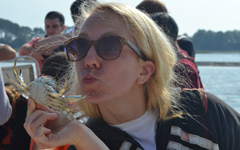
Seitz says one of the key components of the internship is including students who are typically underrepresented in the marine sciences. “We often accept students from historically black universities and the University of Puerto Rico,” she says. “I'm often amazed at the level of understanding that all of our students can attain after just a few short weeks.”
VIMS encourages all students who are interested in marine science to apply for the program. Students can pursue a variety of areas of marine science including marine biology and ecology; biological, geological, chemical, and physical oceanography; environmental science; fisheries; and resource management.
The VIMS REU program is funded by the National Science Foundation’s Research Experience for Undergraduates program, VIMS, The College of William & Mary, private donors, and grants to individual faculty.


